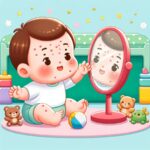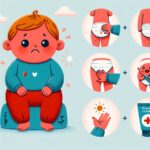Welcome to the world of parenting, where every little bump and spot on your baby’s skin can lead you to a web of questions and concerns. One such condition that might catch your attention is neonatal acne, a common skin issue in newborns that can cause tiny pimples on their delicate skin. In this guide, we’ll dive deep into what neonatal acne is, its causes, symptoms, and effective treatments, ensuring you have all the information you need to tackle this baby skin condition confidently.
What is Neonatal Acne?
Neonatal acne, also known as baby acne, refers to acne that appears on the face of a newborn. Contrary to what one might think, this condition is quite common, affecting around 20% of newborns. These are not the typical acne conditions seen in teenagers or adults, but rather a temporary condition that usually clears up on its own within a few weeks to months after birth. It’s characterized by small, red bumps that can appear on the cheeks, forehead, and chin of the baby.
Despite its prevalence, the exact cause of neonatal acne is still not fully understood. However, it’s believed to be linked to hormonal changes that occur in the baby after birth. These hormones, passed from the mother to the baby during the final stages of pregnancy, stimulate the baby’s oil glands, leading to the development of pimples. Fortunately, neonatal acne is generally harmless and does not cause discomfort to the baby.
How to Identify Neonatal Acne
Identifying neonatal acne is relatively straightforward. The condition manifests as small, red or white bumps on the baby’s face, particularly on the cheeks, chin, and forehead. Sometimes, these pimples might be surrounded by reddish skin. It’s important to distinguish neonatal acne from other skin conditions like erythema toxicum (a harmless, rash-like condition) or milia (tiny white bumps caused by blocked skin glands), as the treatment approach may differ. If in doubt, always consult with a pediatrician.
It’s also essential to monitor the condition for any signs of aggravation or spread. In rare cases, neonatal acne can develop into a more severe form, known as infantile acne, which may require medical intervention. Keeping an eye on the symptoms and consulting with a healthcare provider for a proper diagnosis is key to ensuring your baby’s skin health.
Treating and Managing Neonatal Acne
Most cases of neonatal acne clear up on their own without any specific treatment. However, there are steps you can take to help manage the condition and keep your baby’s skin healthy. First and foremost, maintaining a gentle skincare routine is crucial. Use mild, baby-friendly soap and water to clean the affected areas gently. Avoid using oily or perfumed lotions that could exacerbate the condition. Instead, opt for a light, fragrance-free moisturizer if the skin seems dry.
In some cases, if the acne persists or is severe, a pediatrician might recommend a medicated cream or ointment. It’s important to follow the doctor’s instructions and not apply any over-the-counter acne treatments meant for older children or adults, as these can be too harsh for a newborn’s sensitive skin. Additionally, never pick at or try to pop the pimples, as this can lead to infection or scarring.
For parents looking for more information on managing common baby skin conditions, exploring resources like atopic dermatitis, cradle cap, and diaper rash might provide additional insights into maintaining your baby’s skin health. It’s always beneficial to be well-informed and prepared to address any skin issues that may arise in your baby’s first months.
When to See a Doctor for Neonatal Acne
While neonatal acne typically doesn’t require medical attention, there are circumstances when it might be necessary to consult with a healthcare provider. If the acne is severe, persists beyond the baby’s first few months, or is accompanied by other symptoms such as fever, lethargy, or poor feeding, it’s crucial to seek medical advice. These could be signs of an underlying condition that needs to be addressed.
In addition, if you notice any signs of infection, such as pus-filled pimples, significant redness, or swelling, make an appointment with your pediatrician. They can provide a proper diagnosis and recommend the appropriate treatment to prevent complications. Remember, it’s always better to be safe and get your baby checked out by a professional if you have any concerns about their skin health.
By following a gentle skincare routine, monitoring the condition, and seeking medical advice when necessary, you can effectively manage neonatal acne and ensure your baby’s skin remains healthy and clear. Remember, patience is key, as most cases of neonatal acne will resolve on their own, leaving your baby’s skin smooth and blemish-free.
For further reading on newborn care, you may find these articles on nappy rash and burping helpful. They provide practical tips and insights to navigate the early days of parenthood with confidence.













